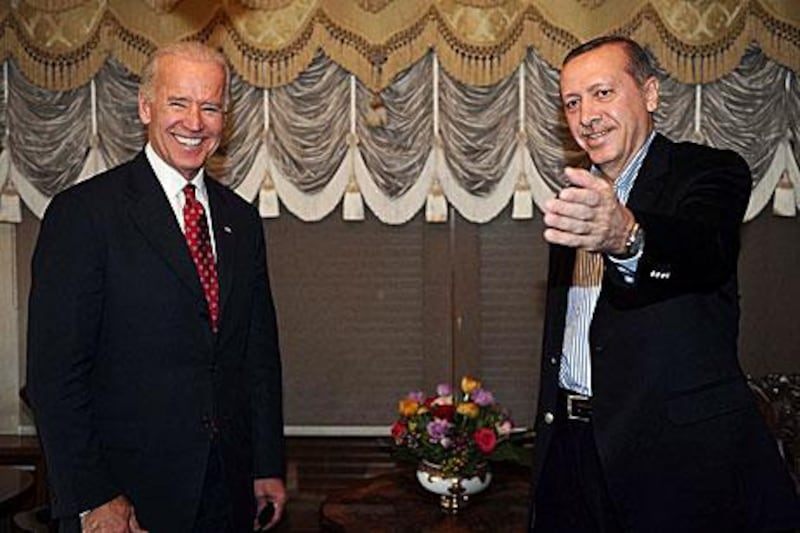ISTANBUL // As Recep Tayyip Erdogan, Turkey's prime minister, is taking time off to recover after a surprise operation last month, the cancellation of two cabinet meetings and a foreign visit this week has triggered speculation about the state of his health and opposition charges that people in the ruling party are using Mr Erdogan's absence to start a power struggle.
The cancellation of the weekly cabinet meeting on Monday despite the presence of four deputy prime ministers was a reminder of Mr Erdogan's key role in decision-making. The weekly meeting of Mr Erdogan's Justice and Development Party (AKP), scheduled for Tuesday, was also cancelled for the second week running.
Yesterday, Mr Erdogan, 57, received Sheikh Hamad bin Khalifa Al Thani, the ruler of Qatar, at his house in Istanbul. The semi-official Anadolu news agency later reported that Mr Erdogan had called off a trip to Qatar scheduled for December 10 and would continue to rest next weekend.
It was the second time that Mr Erdogan's return to work was postponed. The government said last week that the prime minister was planning to be back at work for the cabinet meeting on Monday, but Anadolu later reported that Mr Erdogan would rest for another week.
Mr Erdogan underwent surgery on his lower intestines in an Istanbul hospital on November 26 and was released three days later. The government did not announce the operation in advance and put out a statement only two days afterwards, giving few details about the procedure and the extent of Mr Erdogan's ailment.
Since the operation, Mr Erdogan has been staying in his home in Istanbul, receiving only a few official visitors, among them Cemil Cicek, the speaker of Turkish parliament, and Joe Biden, the US vice president. A medical helicopter was parked near Mr Erdogan's home, news reports said.
Omer Celik, a leading official of the religiously conservative AKP, said the prime minister's absence was no cause for alarm. "Our prime minister is in very, very good health," Mr Celik said in a Twitter message on Sunday. "He just has to rest after the operation. This rest is very normal and necessary."
But media reports questioned whether there was something more serious behind Mr Erdogan's absence. Yesterday, the far-right Yenicag newspaper quoted an unnamed friend of Mr Erdogan's as saying the prime minister had colon cancer. The report followed several stories in the Turkish press last week that speculated about a serious illness.
Mr Erdogan, the leader of the AKP since he founded it 10 years ago and the prime minister since March 2003, is a towering figure in Turkish politics. Using the wide-ranging powers given to party leaders under Turkish law, Mr Erdogan, as the most popular politician in the country and the prime minister in a one-party government, is in a position of strength that few other Turkish politicians have enjoyed since the republic was founded in 1923.
This central position of the prime minister means that Mr Erdogan's absence is keenly felt.
"After 10 years in power, the AKP has a considerable political machine in place, and Erdogan keeps it all together," Ferhat Kentel, a sociologist at Istanbul's Sehir University, said on Monday. "There is a one-man peculiarity about this."
As Mr Erdogan rested outside the public spotlight, speculation about a future change in the AKP leadership intensified.
Muharrem Ince, a deputy leader of the opposition Republican People's Party (CHP), said high-ranking AKP politicians were exploiting Mr Erdogan's absence for their own political ambitions.
"They make use of the prime minister's illness and have started a leadership race," Mr Ince said on Monday.
Mr Ince mentioned Bulent Arinc, a deputy prime minister and the government's spokesman, as well as Abdullah Gul, the current president and a former AKP prime minister. News reports have said Mr Arinc was hoping to replace Mr Erdogan, in the coming years. Mr Erdogan, who has said he will not run again as a parliamentary deputy at the next elections in 2015, is widely expected to launch a bid for the presidency when Mr Gul's term ends in 2014. Mr Gul is reportedly considering a comeback as prime minister.
The Milliyet daily this week quoted an unnamed aide to the prime minister as saying that the party had already agreed on how to keep the AKP in power and how to reassign top posts in the coming years.
According to the alleged scenario, Mr Gul is to step down as president when his term ends in 2014, and Mr Erdogan will be a candidate in the presidential election that year. Mr Arinc would become caretaker prime minister until parliamentary elections in 2015, when Mr Gul, who is almost as popular as Mr Erdogan, could again run as a deputy and take over the prime ministry from Mr Arinc if the AKP wins.
There was no comment from the AKP or the government on the Milliyet report.
Murat Yetkin, a columnist for the Radikal, compared the alleged scenario to the planned leadership shuffle between Vladimir Putin, the Russian prime minister, and Dmitry Medvedev, the president.






